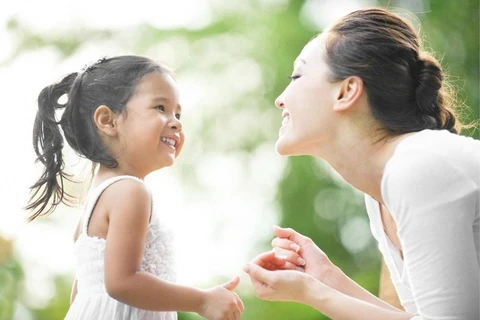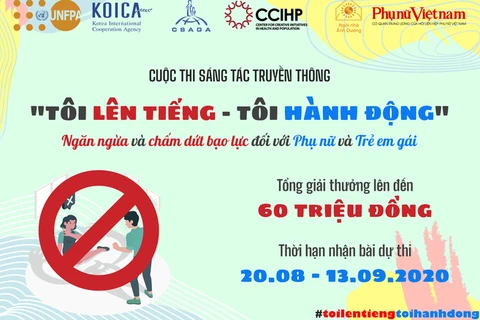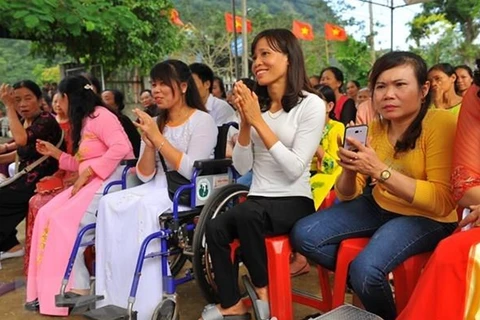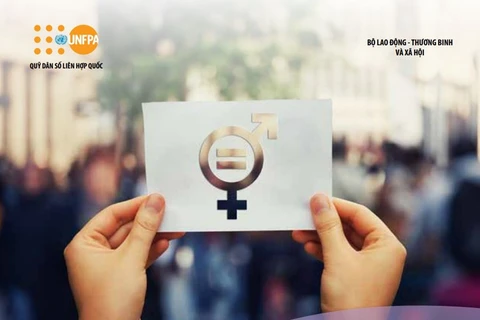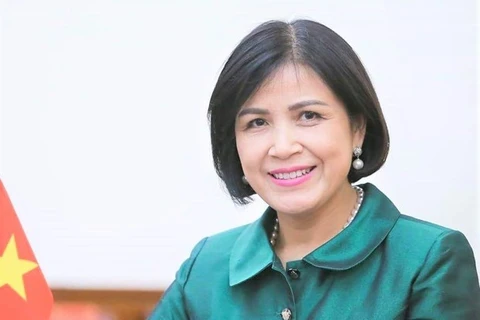 The launching of the “Youth address gender stereotypes and promote gender equality” project in Vietnam (Photo: Vietnam Plus)
The launching of the “Youth address gender stereotypes and promote gender equality” project in Vietnam (Photo: Vietnam Plus)
Hanoi (VNA) - Students majoring in communications and journalism will be trained in knowledge and skills to become change makers of gender stereotypes in the community, as heard at a workshop held in Hanoi on September 25 to kick off a project titled “Youth address gender stereotypes and promote gender equality”.
The project is funded by the European Union and implemented by Oxfam in Vietnam and the Consultative Institute for Socio-Economic Development of Rural and Mountainous Areas (CISDOMA).
Scheduled to last until 2024, it aims to encourage young people to participate in changing gender stereotypes and promoting gender equality in Vietnam. Participating students will help create changes in awareness and action on gender equality through social media campaigns.
The number of beneficiaries reaches up to 3 million people living in Hanoi, Da Nang and Ho Chi Minh City, or about 17 percent of the total population of the three biggest cities in the country.
Stereotypes in mass media
According to studies by Oxfam, the stereotypes have been portrayed in films, radio and television programmes, advertisements, and video games, among other mass media platforms.
For example, advertisements of seasoning products like fish and soy sauces often feature a woman cooking in the kitchen while her husband and kids sitting at the table and eating her freshly made dishes. Men are more likely to appear in the advertisements of cars and business-investment products, while women frequently endorse cosmetics and home goods.
The studies also found that male leaders dominated in the news by being interviewed, quoted or written about for several times higher than their female peers.
Youth to get the ball rolling
The National Strategy on Gender Equality 2011-2020 aimed to cut cultural and information products bearing gender bias by 60 percent in 2015 and by 80 percent this year. Young people and students can become pioneers in changing gender stereotypes.
Oxfam Vietnam Deputy Country Director Pham Quang Tu said young people aged between 15 and 24 are key to the promotion of gender equality. Receiving assistance to partake and be creative, they could be pioneers in changing gender stereotypes.
The target groups of the project comprise 1,000 youth in five universities; 20 community- and university-based youth groups in the three cities; marketing managers and chief executive officers of 50 enterprises; 100 journalists; and 3 million people in those cities.
 Women are completely capable of succeeding in male-dominated fields. (Illustrative photo: HR Online)
Women are completely capable of succeeding in male-dominated fields. (Illustrative photo: HR Online)
The 1,000 young people will help create changes in awareness and action on gender equality by initiating their own social media campaigns.
Speaking at the launch, Nguyen Thi Cuc Phuong, deputy principal of the Hanoi University, said the role of the press, media and advertising in the effort to narrow the gender gap towards gender equality is extremely important.
She said she fully believes that the organisations and universities involved will work closely for the common goal of successfully implementing the project in Vietnam.
Le Van Thanh, a representative of the EU mission, said that in its research on employment, women with children face many difficulties in applying for jobs. Their chance of being accepted are lower than that of other candidates; and they are estimated to have lost more than 90 percent of job opportunities.
Women are completely capable of succeeding in areas that used to be male-dominated, and vice versa, Thanh underscored./.
| The CISDOMA, established in 2000, is a Vietnamese non-governmental organisation. It is working in partnership with local people, organisations and government bodies to help the poor in Vietnam meet their basic needs as well as expand their opportunities to reach their full potential. Oxfam is a confederation of 19 organisations working together in more than 90 countries. Oxfam in Vietnam is working to seek transformative changes in policies, practices and beliefs in ways that will fundamentally improve the lives of poor and marginalised women and men, and ensure that all citizens have the same opportunity to enjoy their rights. |
